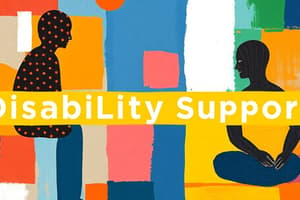Podcast
Questions and Answers
Disability support refers to the assistance provided to individuals with ______ to help them achieve their daily living goals and participate fully in their communities.
Disability support refers to the assistance provided to individuals with ______ to help them achieve their daily living goals and participate fully in their communities.
disabilities
Disability support is a critical aspect of ______, as it enables individuals with disabilities to live independently and participate in activities they enjoy.
Disability support is a critical aspect of ______, as it enables individuals with disabilities to live independently and participate in activities they enjoy.
caregiving
One type of disability support is ______ assistance, which provides help with household tasks such as cleaning, cooking, and laundry.
One type of disability support is ______ assistance, which provides help with household tasks such as cleaning, cooking, and laundry.
domestic
The ______ model of disability support focuses on curing or managing the disability, with an emphasis on medical interventions.
The ______ model of disability support focuses on curing or managing the disability, with an emphasis on medical interventions.
The ______ model of disability support views disability as a social construct, focusing on removing barriers and promoting inclusion.
The ______ model of disability support views disability as a social construct, focusing on removing barriers and promoting inclusion.
Primary ______ provide daily support and assistance to individuals with disabilities.
Primary ______ provide daily support and assistance to individuals with disabilities.
Individuals with disabilities may face ______ and discrimination that limit their participation and inclusion.
Individuals with disabilities may face ______ and discrimination that limit their participation and inclusion.
Caregivers may advocate for the individual with a disability to access ______, services, and opportunities.
Caregivers may advocate for the individual with a disability to access ______, services, and opportunities.
Flashcards are hidden until you start studying
Study Notes
Disability Support in Caregiving
Definition and Scope
- Disability support refers to the assistance provided to individuals with disabilities to help them achieve their daily living goals and participate fully in their communities.
- Disability support is a critical aspect of caregiving, as it enables individuals with disabilities to live independently and participate in activities they enjoy.
Types of Disability Support
- Personal care: assistance with daily living activities such as bathing, dressing, grooming, and toileting.
- Domestic assistance: help with household tasks such as cleaning, cooking, and laundry.
- Respite care: temporary relief for primary caregivers, providing a break from caregiving responsibilities.
- Rehabilitation and therapy: support for individuals with disabilities to develop or regain skills and abilities.
Models of Disability Support
- Medical model: focuses on curing or managing the disability, with an emphasis on medical interventions.
- Social model: views disability as a social construct, focusing on removing barriers and promoting inclusion.
- Recovery model: emphasizes the individual's potential for recovery and growth, with a focus on strengths and abilities.
Caregiver Roles and Responsibilities
- Primary caregivers: family members, friends, or paid caregivers who provide daily support and assistance.
- Secondary caregivers: healthcare professionals, therapists, and other service providers who offer specialized support.
- Advocacy: caregivers may advocate for the individual with a disability to access resources, services, and opportunities.
Challenges and Opportunities
- Stigma and discrimination: individuals with disabilities may face social and economic barriers that limit their participation and inclusion.
- Lack of resources: limited access to support services, funding, and resources can hinder the provision of effective disability support.
- Empowerment and autonomy: disability support can promote independence and self-advocacy, enabling individuals with disabilities to take control of their lives.
Best Practices in Disability Support
- Person-centered approach: support is tailored to the individual's unique needs, preferences, and goals.
- Inclusive and accessible environments: physical and social environments that promote participation and inclusion.
- Collaboration and communication: effective communication and collaboration between caregivers, healthcare professionals, and the individual with a disability.
Disability Support in Caregiving
Definition and Scope
- Disability support enables individuals with disabilities to achieve daily living goals and participate in their communities.
- It's a critical aspect of caregiving, promoting independence and community participation.
Types of Disability Support
- Personal care support includes assistance with bathing, dressing, grooming, and toileting.
- Domestic assistance involves help with household tasks like cleaning, cooking, and laundry.
- Respite care provides temporary relief for primary caregivers, giving them a break.
- Rehabilitation and therapy support helps individuals develop or regain skills and abilities.
Models of Disability Support
- The medical model focuses on curing or managing the disability through medical interventions.
- The social model views disability as a social construct, removing barriers and promoting inclusion.
- The recovery model emphasizes the individual's potential for recovery and growth, focusing on strengths and abilities.
Caregiver Roles and Responsibilities
- Primary caregivers, often family members, friends, or paid caregivers, provide daily support and assistance.
- Secondary caregivers, like healthcare professionals and therapists, offer specialized support.
- Caregivers may advocate for the individual with a disability to access resources, services, and opportunities.
Challenges and Opportunities
- Individuals with disabilities may face stigma and discrimination, limiting their participation and inclusion.
- Limited access to support services, funding, and resources can hinder effective disability support.
- Disability support can promote empowerment and autonomy, enabling individuals to take control of their lives.
Best Practices in Disability Support
- A person-centered approach tailors support to the individual's unique needs, preferences, and goals.
- Inclusive and accessible environments promote participation and inclusion.
- Effective communication and collaboration between caregivers, healthcare professionals, and the individual with a disability are essential.
Studying That Suits You
Use AI to generate personalized quizzes and flashcards to suit your learning preferences.




